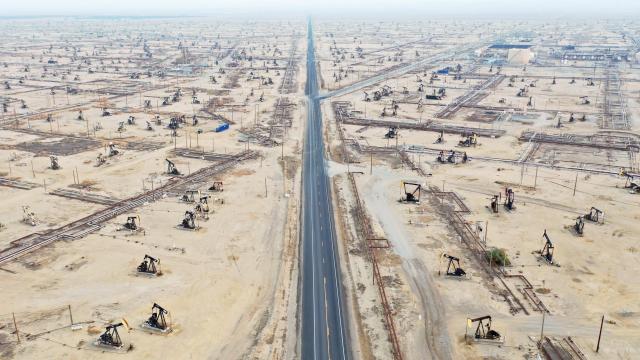GLASGOW, SCOTLAND — In a major announcement at United Nations climate talks on Thursday, 20 countries said they would stop funding fossil fuel development abroad and instead plow money into clean energy.
The move could constrain risky new fossil fuel projects, which is great because the atmosphere is running out of capacity for more carbon dioxide. But while the news is undoubtedly good, details still need to be worked out — and more countries and banks need to hop on board to give the world a fighting shot at preventing global warming above the 1.5-degree-Celsius (2.7-degree-Fahrenheit) target.
The group of countries includes finance heavy-hitters like the U.S., UK, and Canada as well as smaller players like Mali and Costa Rica. An analysis by Oil Change International indicates that the 20 countries plus four other investment institutions who signed on could shift $US15 ($AU20) billion annually from funding fossil fuels to clean energy projects.
Winding down new fossil fuel production as rapidly as possible is one of the keys to meeting the world’s climate goals. A report released earlier this year by the International Energy Agency found that new exploration needs to stop next year. The 20 countries have said they’ll do just that as far as funding projects go. In that light, this is a major climate win.
“The signatories of today’s statement are doing what’s most logical in a climate emergency: stop adding fuel to the fire and shift dirty finance to climate action,” Laurie van der Burg, the global public finance campaigns co-manager at Oil Change International, said in an emailed statement.
The announcement adds to other efforts to address fossil fuel extraction announced at COP26 including phasing out coal in some countries and addressing methane emissions in others.
“Given how important public finance is for de-risking and crowding in private capital for fossil fuel projects, especially in emerging markets, it’s quite a big deal,” Justin Guay, the director for global climate strategy at the Sunrise Project, told E&E News.
As your pesky local climate reporter, I also must follow up this bit of positive news with a few key caveats. First and foremost, the agreement doesn’t pull funding from projects already in the pipeline (climate joke, please laugh). Between 2018 and 2020, Oil Change International also found, the G20 kicked an estimated $US188 ($AU253) billion to fossil fuel projects in other countries. That’s a lot of very recent extraction happening.
The lack of financing abroad also doesn’t mean a lack of financing at home. The U.S. and Canada, for example, are major oil and gas producers. Without a plan to wind down production at home, the pledge to end financing for fossil fuels abroad is a bit like promising you won’t lend your neighbour money for cigarettes while you keep smoking a pack a day.
Some of the biggest smokers — errr, fossil fuel funders — on the block also didn’t sign on. Those include Japan, Korea, and China, which are the biggest fossil fuel backers in the G20, according to Oil Change International. Together, they account for more than $AU39 billion in annual fossil fuel development abroad. That’s a major lifeline for fossil fuel developers.
We also still need more details on the pledge to end funding, including how exactly the 20 countries and banks define fossil fuel funding. Could a project that commits to using carbon capture, a largely ineffective means to make dirty energy seem more climate-friendly, be considered for funding? If so, that would indicate the agreement has no teeth.
Lastly, the world’s private banks and investment firms also need to sign on. So far, the splashiest offer from the titans of private investment at the UN talks came courtesy of Mark Carney, former head of the Bank of England, who said 450 firms with $AU175 trillion in assets were committing to aligning their investments with net zero. While that’s a lot of money, most of it is locked up in things like mortgages, so the pot for climate-focused investments is smaller than it seems. And it seems ripe for greenwashing.
“We’ve seen this act before,” Rachel Rose Jackson, the director of climate research and policy at Corporate Accountability, said in an emailed statement. “Corporations and financial enablers that knowingly fuelled the climate crisis make big promises and pledge big numbers. Then they fail to deliver, while causing tremendous harm. It’s impossible to take seriously any pledge from the financiers of the climate crisis. These actors need to tell us exactly how their pledges are going to keep temperature rise to below 1.5º Celsius.”
The new pledge from the U.S. and 19 other countries and four development banks to no longer fund fossil fuel development seems, at least, like a good place to start.
